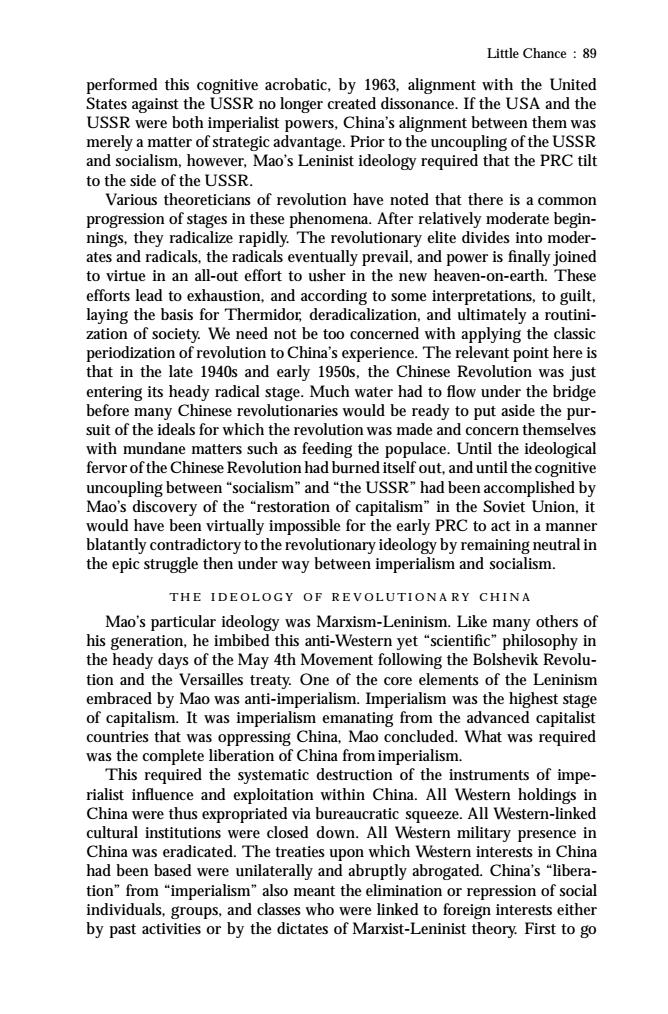正在加载图片...

Little Chance 89 performed this cognitive acrobatic,by 1963,alignment with the United States against the USSR no longer created dissonance.If the USA and the USSR were both imperialist powers,China's alignment between them was merely a matter of strategic advantage.Prior to the uncoupling of the USSR and socialism,however,Mao's Leninist ideology required that the PRC tilt to the side of the USSR. Various theoreticians of revolution have noted that there is a common progression of stages in these phenomena.After relatively moderate begin- nings,they radicalize rapidly.The revolutionary elite divides into moder- ates and radicals,the radicals eventually prevail,and power is finally joined to virtue in an all-out effort to usher in the new heaven-on-earth.These efforts lead to exhaustion,and according to some interpretations,to guilt, laying the basis for Thermidor,deradicalization,and ultimately a routini- zation of society.We need not be too concerned with applying the classic periodization of revolution to China's experience.The relevant point here is that in the late 1940s and early 1950s,the Chinese Revolution was just entering its heady radical stage.Much water had to flow under the bridge before many Chinese revolutionaries would be ready to put aside the pur- suit of the ideals for which the revolution was made and concern themselves with mundane matters such as feeding the populace.Until the ideological fervor of the Chinese Revolution had burned itself out,and until the cognitive uncoupling between"socialism"and "the USSR"had been accomplished by Mao's discovery of the "restoration of capitalism"in the Soviet Union,it would have been virtually impossible for the early PRC to act in a manner blatantly contradictory to the revolutionary ideology by remaining neutral in the epic struggle then under way between imperialism and socialism. THE IDEOLOGY OF REVOLUTIONARY CHINA Mao's particular ideology was Marxism-Leninism.Like many others of his generation,he imbibed this anti-Western yet "scientific"philosophy in the heady days of the May 4th Movement following the Bolshevik Revolu- tion and the Versailles treaty.One of the core elements of the Leninism embraced by Mao was anti-imperialism.Imperialism was the highest stage of capitalism.It was imperialism emanating from the advanced capitalist countries that was oppressing China,Mao concluded.What was required was the complete liberation of China from imperialism. This required the systematic destruction of the instruments of impe- rialist influence and exploitation within China.All Western holdings in China were thus expropriated via bureaucratic squeeze.All Western-linked cultural institutions were closed down.All Western military presence in China was eradicated.The treaties upon which Western interests in China had been based were unilaterally and abruptly abrogated.China's "libera- tion"from "imperialism"also meant the elimination or repression of social individuals,groups,and classes who were linked to foreign interests either by past activities or by the dictates of Marxist-Leninist theory.First to goLittle Chance : 89 performed this cognitive acrobatic, by 1963, alignment with the United States against the USSR no longer created dissonance. If the USA and the USSR were both imperialist powers, China’s alignment between them was merely a matter of strategic advantage. Prior to the uncoupling of the USSR and socialism, however, Mao’s Leninist ideology required that the PRC tilt to the side of the USSR. Various theoreticians of revolution have noted that there is a common progression of stages in these phenomena. After relatively moderate beginnings, they radicalize rapidly. The revolutionary elite divides into moderates and radicals, the radicals eventually prevail, and power is finally joined to virtue in an all-out effort to usher in the new heaven-on-earth. These efforts lead to exhaustion, and according to some interpretations, to guilt, laying the basis for Thermidor, deradicalization, and ultimately a routinization of society. We need not be too concerned with applying the classic periodization of revolution to China’s experience. The relevant point here is that in the late 1940s and early 1950s, the Chinese Revolution was just entering its heady radical stage. Much water had to flow under the bridge before many Chinese revolutionaries would be ready to put aside the pursuit of the ideals for which the revolution was made and concern themselves with mundane matters such as feeding the populace. Until the ideological fervor of theChinese Revolution had burned itself out, and until the cognitive uncoupling between “socialism” and “the USSR” had been accomplished by Mao’s discovery of the “restoration of capitalism” in the Soviet Union, it would have been virtually impossible for the early PRC to act in a manner blatantly contradictory to the revolutionary ideology by remaining neutral in the epic struggle then under way between imperialism and socialism. T H E I D E O L O G Y O F R E V O L U T I O N A R Y C H I N A Mao’s particular ideology was Marxism-Leninism. Like many others of his generation, he imbibed this anti-Western yet “scientific” philosophy in the heady days of the May 4th Movement following the Bolshevik Revolution and the Versailles treaty. One of the core elements of the Leninism embraced by Mao was anti-imperialism. Imperialism was the highest stage of capitalism. It was imperialism emanating from the advanced capitalist countries that was oppressing China, Mao concluded. What was required was the complete liberation of China from imperialism. This required the systematic destruction of the instruments of imperialist influence and exploitation within China. All Western holdings in China were thus expropriated via bureaucratic squeeze. All Western-linked cultural institutions were closed down. All Western military presence in China was eradicated. The treaties upon which Western interests in China had been based were unilaterally and abruptly abrogated. China’s “liberation” from “imperialism” also meant the elimination or repression of social individuals, groups, and classes who were linked to foreign interests either by past activities or by the dictates of Marxist-Leninist theory. First to go